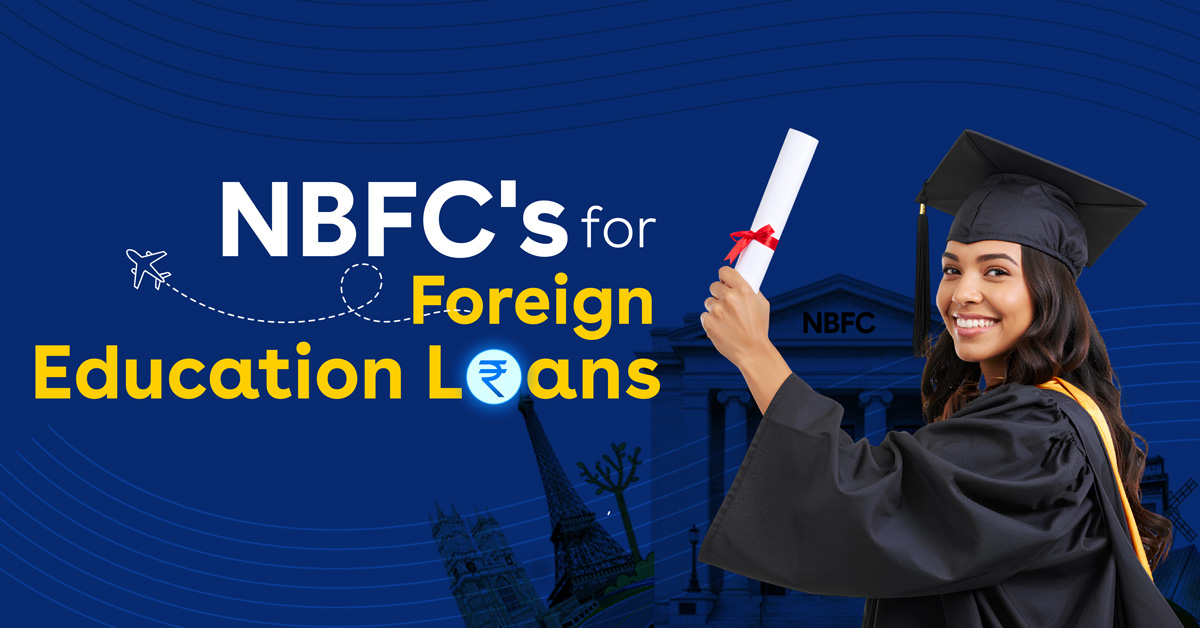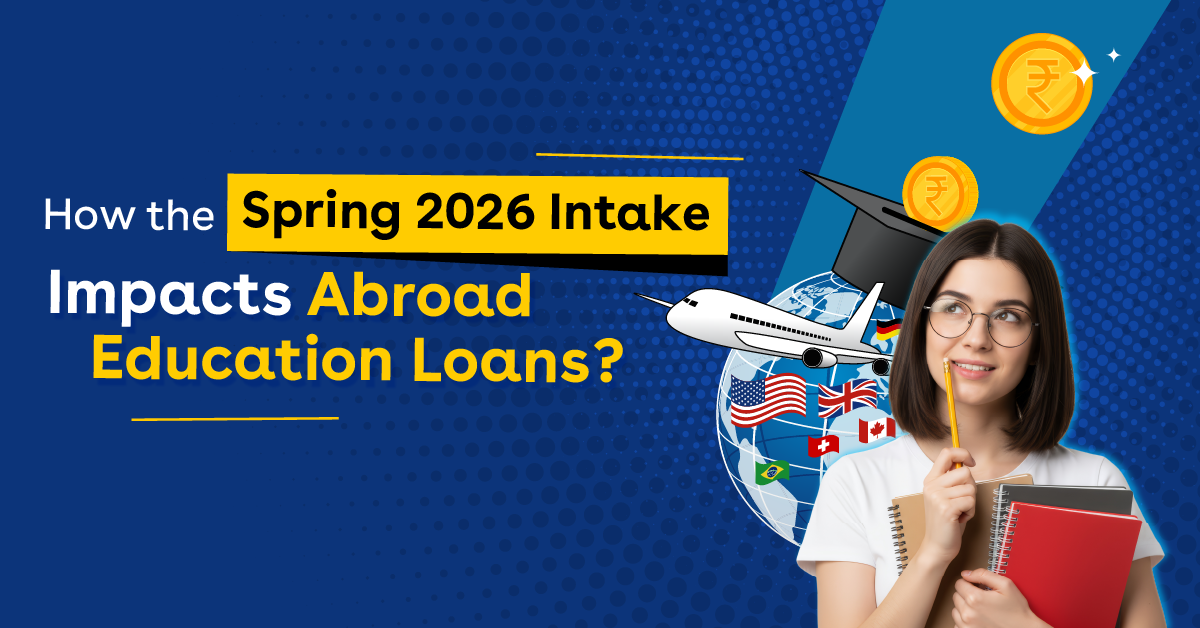Jun 30, 2025
Abroad Education Loan Without Family Support: Best Lenders, Eligibility, Process & More
As a study abroad aspirant, you've worked tirelessly for years, aced your standardized tests, and finally received that golden acceptance letter from your dream foreign University. While you are brimming with excitement and the potential that it brings along, the big question lies in how you will fund this? If you have no co-applicant, no collateral or no financial support from family, it is easy to feel like the odds are stacked against you. But here’s the fact: you are not alone, and you are not out of options.
Today, an increasing number of students are carving their paths to international education without relying on traditional support systems. Lenders are evolving, and so are the financial norms. Thus, if you are provided with the right information, you can absolutely fund your overseas education on your own terms.
This isn’t just another article; it’s your financial blueprint. Whether you are without a co-signer, unable to pledge collateral, or simply seeking autonomy, this comprehensive guide will walk you through every step of the process confidently and thoughtfully.
Possibility of Abroad Education Loan Without Family Support
Are you wondering if getting an education loan without family support is possible? Well, the answer is a 100% yes. While traditional abroad education loans have long leaned on parental income or property as a safety net, modern financial solutions are progressing. Several global lenders and fintech firms now offer education loans based on merit, career prospects, and institutional reputation. So, no collateral, co-applicant, or family dependency is required.
Instead of asking who can back you, they ask: where are you going, and what will you become? Whether you are aiming for a Master’s in the U.S., a Diploma in Canada, or an MBA in Europe, the key lies in knowing where to look, understanding your eligibility, and presenting your academic journey as your strongest asset and that’s exactly what the rest of this article is here to help you.
Top Lenders Offering Abroad Education Loans Without Family Support
Fortunately, several trusted Banks and International Lenders have stepped up with appropriate solutions and exclusive education loan scheme for students like you. Let’s explore the leading Banks and Lenders that are not only saying "yes" to your dreams but also supporting you.
Punjab National Bank – PNB Udaan Scheme
Loan Amount: Up to INR 1.5 with collateral
Interest Rate: Starting from 9.25% p.a. for Top-Ranked Universities
Key Highlights:
Accepts collateral from friends or third parties
Lenient co-applicant requirements
0.5% interest concession for female students & 1% concession if interest is paid during the moratorium period.
State Bank of India (SBI) – Global Ed-Vantage Scheme
Loan Amount: Up to INR 50 Lakhs for unsecured loans
Interest Rate: Starting from 9.65% p.a.
Key Highlights:
Exclusively for a Master’s Degree at any of the Top 100 Universities abroad as listed by the bank.
Scholarships are considered as loan margin.
0.5% interest concession for female students.
Prodigy Finance
Loan Amount: Up to $220,000
Interest Rate: Fixed rates starting from 10.55%
Key Highlights:
Ideal for Postgraduate courses like MBA, Engineering, MS, and more
No co-signer, credit history or collateral needed
No need to pay the interest amount during the moratorium period
MPOWER Financing
Loan Amount: Up to $100,000
Interest Rate: Fixed rates starting at 11.99%
Key Highlights:
No co-signer, no collateral, no credit history needed
Available to over 500 top-tier Universities
Interest-based payments while you study
US Co-Signer Loans
Loan Amount: Up to $100,000 or more based on the cost of attendance
Interest Rate: Starts from 3.55% and goes up to 13.50%
Key Highlights:
Requires a US-based co-signer who can be a friend or acquaintance.
Up to 100% funding covering all kinds of study expenses.
No processing fees, quick and transparent processing.
So, you've discovered the lenders that believe in your potential and offer financial support without asking for a family safety net. But before you take the plunge into applications, it's fundamental to understand what makes you eligible for these education loans. Lenders may not need a co-applicant, but they still need assurance that you're a worthwhile investment.
Eligibility Criteria for Abroad Education Loans Without Family Support
When applying for an education loan without collateral or a co-applicant, lenders shift their focus from your background to your future potential. This means that the spotlight is on your academic performance, the University you've been accepted into, and your post-study earning prospects.
Here are the standard eligibility parameters most overseas education loan providers expect:
Confirmed admission from a recognized Institution, particularly those listed in lender-approved Institutions, is often the cornerstone of your eligibility.
Most lenders focus on Postgraduate programs such as MS, MBA, or other Professional Master’s Degrees. However, some also support Undergraduate, PhD, and Diploma Courses, depending on the country and Institution.
A strong academic background, generally 60% or above in previous qualifications, is essential. Lenders assess your consistency, GPA, and sometimes even performance in standardized tests like the GRE or GMAT.
Future earning potential is considered. That means your field of study, job placement trends for your university, and salary benchmarks in your destination country play a major role.
For Indian students, Indian citizenship is a basic requirement. For international lenders, you must hold a valid student visa or demonstrate eligibility to obtain one.
Most lenders require applicants to be between 18 and 35 years of age at the time of loan application.
Meeting these criteria doesn't guarantee approval, but it positions you strongly in the eyes of lenders. The goal is to show that you are capable, employable, and ready to repay, even without family financial backing. Now that you are clear on the eligibility criteria, it's time to gather the paperwork that brings your application to life.
Documents Required for Abroad Education Loan Without Family Support
Applying for an education loan without family support means your documentation must be clear, complete, and compelling. Every paper you submit is a building block in gaining the lender’s trust, so let’s make sure you have everything in place.
Here’s a comprehensive checklist most lenders will ask for:
Personal ID Documents
Valid Passport
Aadhaar Card & PAN Card (for KYC compliance)
Academic Credentials & Documents
10th, 12th, and Graduation Mark Sheets and Certificates
Test scores of GRE, GMAT, SAT, TOEFL, IELTS (Whichever is applicable)
Resume or CV highlighting academic and work experience (especially for Master’s/MBA applicants)
Admission-Related Documents
Official admission offer letter or I-20 (for U.S. Universities)
Fee structure or cost of attendance from the University
Financial Documents
Last 6 months’ personal bank statements (yours or sponsor, if applicable)
Income proof, offer letter, salary slips, Form 16 (if you have worked previously)
Income Tax Returns along with supporting documents
Loan Application Form & Declaration
Duly filled loan application form (can be online or physical, depending on the lender)
Having your documents ready and organized not only speeds up the loan process but also shows lenders that you are serious and prepared, exactly the kind of borrower they want to support. The next big step is putting it all into motion. Thankfully, applying for an abroad education loan today is no longer a tedious, paperwork-heavy affair; most lenders offer streamlined, digital-first processes designed with student convenience in mind.
Application Process for Abroad Education Loan Without Family Support
When you don’t have collateral or a co-applicant, your application must stand out for all the right reasons. Given below is a step-by-step guide to help you complete the process like a pro:
Step 1: Shortlist the Right Lender
Begin by comparing lenders based on interest rates, moratorium benefits, supported countries/universities, and repayment flexibility. Go for the one that best aligns with your financial needs.
Step 2: Check your Eligibility Online
Visit the lender’s official website and use their loan eligibility checker. This quick check saves time and gives clarity on your chances before starting the full application.
Step 3: Complete the Loan Application Form
Most lenders offer a user-friendly online form. Complete your personal, academic, and financial details correctly. Double-check the whole thing before submitting.
Step 4: Upload & Submit the Required Documents
Upload copies of all mandatory documents. Some lenders offer document verification via email or secure portals, while others may require original submission or in-person verification.
Step 5: Loan Assessment & Approval
Once your application is submitted, the lender’s team will evaluate your profile holistically. If needed, they may schedule a quick interview or request clarification.
Step 6: Loan Sanction & Agreement Signing
Upon approval, you’ll receive a sanction letter detailing the loan amount, interest rate, repayment schedule, and terms. Carefully read through the agreement before signing.
Step 7: Disbursement of Funds
Once signed, the loan amount is usually disbursed directly to the University in multiple instalments, aligned with tuition fee deadlines.
After your loan is sanctioned and disbursed, your immediate focus can shift entirely to your academics. But it’s just as important to understand when and how you’ll start repaying, because smart planning today leads to stress-free repayment tomorrow.
Moratorium Period & Repayment Tenure for Abroad Education Loans Without Family Support
When you are studying abroad without family support, having breathing room before repayment begins is a blessing. That’s exactly what the moratorium period offers: a financial cushion that allows you to focus on your studies without the pressure of immediate repayments. However, depending on the lender, you may also get the benefit of deferring interest payments or be asked to pay simple interest or partial EMIs during this time.
The standard moratorium periods by lenders are usually the course duration, with an additional 6 to 12 months. Once the moratorium ends, your repayment officially begins. Most lenders offer flexible tenures from 7 to 20 years, depending on your loan terms and repayment plan.
Understanding your moratorium and repayment options upfront ensures you’re financially prepared and never caught off guard. Going forward, let’s take a step back to the phase of getting your loan approved in the first place. The subsequent section has excellent tips that can boost your odds of loan approval.
Tips to Boost Abroad Education Loan Approval Chances
Getting your education loan approved without family support isn’t just about luck; it’s about strategy. Lenders need confidence in you, and that means proving that you are a financially responsible, academically serious, and career-ready applicant. Here are powerful, actionable ways to strengthen your profile and increase your approval probability:
1. Maintain a Healthy Bank Account for 6+ Months
A stable average monthly balance shows financial discipline and stability. Try to avoid large, erratic transactions and keep a healthy flow of funds in your account.
2. Improve or Build your CIBIL/Credit Score
Even if you have never taken a loan before, you can build a credit history by taking a small personal loan or credit card and repaying on time.
3. Opt for FD-Backed Loans
If you or someone in your extended network holds a fixed deposit, consider applying for a loan against that FD. Some lenders may treat this as a semi-secured loan, reducing your interest rate and increasing approval chances.
4. Get Admission into Top-Tier or In-Demand Programs
Admission to reputed global universities or high-ROI programs like STEM, MBA, and Data Science drastically improves your loan profile. Lenders feel more secure knowing your earning potential is strong post-graduation.
5. Avoid Multiple Loan Applications at Once
Too many inquiries in a short time can negatively impact your credit profile. Choose 2–3 suitable lenders and apply with focused, personalized applications.
A little preparation goes a long way. By positioning yourself as a responsible and goal-driven borrower, you can get financing even in the absence of family support. Later, the focus eventually shifts to the next important step of repayment. The next section has smart strategies to stay in control of your finances and avoid feeling overwhelmed.
Repayment Strategies for Abroad Education Loans Without Family Support
Repaying an education loan without the safety net of family support may seem challenging, but with the right approach, it becomes an empowering financial milestone. The key is to combine discipline with creativity, and strategy with consistency. Some of the proven and efficient ways to stay ahead in your loan repayment journey are listed below:
1. Start Repaying Interest Early, Even During the Moratorium
If possible, begin paying off the interest during your study period. Even small payments can significantly reduce the overall interest burden and help you finish repayment sooner.
2. Take up Part-Time Jobs and Internships Abroad
Make the most of permissible part-time work options or paid internships. Even allocating a portion of this income to your loan repayment can ease long-term pressure.
3. Create a Realistic Repayment Budget
Once you start earning, draw a monthly budget that prioritises your loan EMI. Use budgeting apps or simple spreadsheets to track income, expenses, and loan progress.
4. Consider Refinancing for Better Rates
After graduation, you may qualify for better interest rates based on your income and improved credit profile. Refinancing with another lender can reduce your monthly burden or shorten your tenure.
5. Make Lump Sum Payments with Bonuses or Savings
Any monetary windfall, like tax refunds, bonuses, scholarships, or freelance income, can be partially allocated toward your loan. Lump sum prepayments bring down the principal and reduce total interest.
6. Build a Small Emergency Fund
Even while repaying your loan, try to set aside an emergency fund. This prevents you from defaulting on EMIs in case of unexpected expenses.
Taking control of your repayment journey not only builds financial independence but also strengthens your credit standing for future goals like settling abroad, buying a car, or even owning a home.
To wrap up, we understand that it’s harder without financial backing from the family, but it’s far from impossible. With a strong academic profile, clear planning, and the right loan advisor, you can claim the education you deserve.
That’s exactly what Team Elan does; we’re not just a service provider, but your comprehensive support system. We understand the challenges, the questions, and the quiet worries that come with financial planning to study abroad. The road may be less conventional, but it leads exactly where you want to go. Connect with our team today to discuss your options, find the best bank for education loan and have a hassle-free experience!
FAQs
Is it possible to apply for multiple education loans at once to increase my chances?
While technically possible, it's not advisable. Applying for multiple loans simultaneously can affect your credit score and raise red flags with lenders. Instead, focus on improving your eligibility and applying to the best-fit lender.
What happens if I fail to repay my unsecured education loan on time?
Missing repayments on an unsecured loan can impact your credit score, lead to penalties, and may affect your visa or employment prospects abroad. Communication with your lender and restructuring options are crucial if repayment issues arise.
Are there any lenders that approve education loans before University admission?
Yes, some NBFCs and International Lenders offer conditional approvals or pre-approval letters based on your academic profile and shortlisted Universities. This can help during your visa application process.
Can I switch my loan to another lender after going abroad?
Yes, refinancing is a viable option once you have a stable income post-graduation. Many Banks and Financial Institutions offer refinancing or balance transfer facilities with better terms, especially for working professionals abroad.
How does the visa process work with unsecured loans from International Lenders?
Lenders like MPower and Prodigy are recognized by many embassies, including the U.S. and Canada. Their loan sanction letters are accepted during the visa process, provided the disbursed amount meets the financial proof requirement.

- Share this Article
Articles on Overseas Education Loans

NBFC Foreign Education Loans vs Banks
As the number of Indian students wishing to go abroad increases..Feb 02, 2026

Pre Visa vs Post Visa Study Abroad Loan Disbursement
We all can recall the scenes from heist movies...Jan 30, 2026

How Spring 2026 Intake Impacts Abroad Education Loans
With the commencement of 2026, the Spring intake starts....Jan 30, 2026

 Login
Login